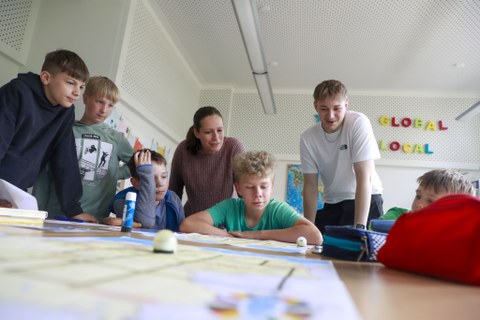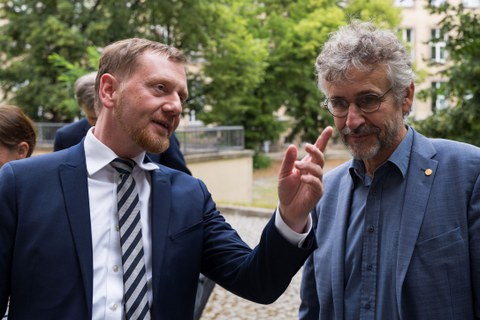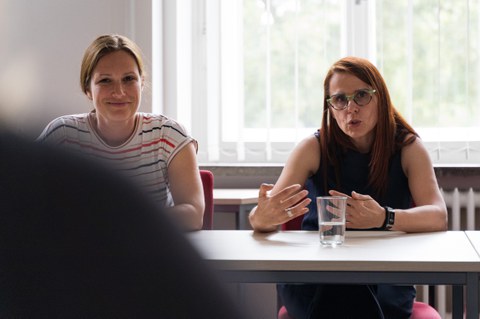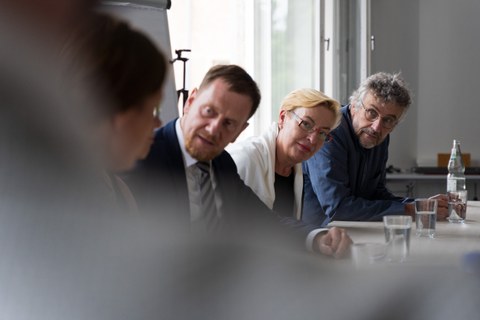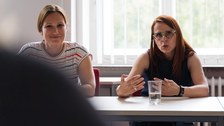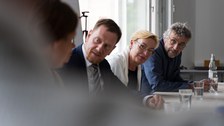Jul 03, 2024
More practical experience for students and fewer canceled lessons at schools – TU Dresden pilot project in East Saxony enters the next phase
What measures can mitigate the consequences of the teacher shortage and how can student teachers benefit from these measures? Saxony's Minister President Michael Kretschmer visited TUD Dresden University of Technology on July 2, 2024 to find out about a specific project. At the Faculty of Education, participants in the first pilot phase reported on their positive experiences at two secondary schools in Zittau and Weißwasser and enthusiastically promoted the practical training alongside the semester. Sabrina Hälschke, principle of the Richard-von-Schlieben secondary school in Zittau, supported them in the lecture hall. From the start of the 2024/25 school year, TUD and the Saxon State Ministry for Education and Cultural Affairs will provide financial support, with additional funding from the Saxon State Ministry for Science, Culture and Tourism being sought in the future.
Prof. Anke Langner is the project manager and her conclusion after the first pilot phase is positive: "The project has been met with great interest in the region of East Saxony, as the students support the local teachers during their regular internships by working with the pupils in innovative ways, supporting them in independent learning and in their learning process."
New project phase starts from the 2024/2025 school year
TU Dresden's project to intensify the dovetailing of theory and practice in teacher training and at the same time mitigate the consequences of the teacher shortage in Lusatia will enter its second pilot phase at the start of the 2024/2025 school year. Rather than 14 students at two schools, 60 future teachers will be able to gain practical experience in small learning groups at five schools every Friday and later reflect on their experiences in accompanying sessions.
Prof. Michael Kobel, TU Dresden's Vice-Rector Academic Affairs, praises the win-win situation for both students and Lusatia: "The project fits wonderfully with TUD's commitment to the establishment and expansion of a TUD | Lusatia Campus to foster a successful structural change. At the same time, it fulfills the wish of student teachers for more and earlier practical work experience."
The participating students grow into their role as teachers early on in their studies and at the same time help to reduce the number of teaching hours lost. But not only that: The hours worked are partially credited as compulsory coursework and the additional hours worked are remunerated, which makes the pilot project an appealing option for students to grow into the teaching profession and combine this experience with a student job.
Scientific support and evaluation
The Chair of Education / Inclusive Education at TUD is providing scientific support and evaluating the project. The aim of the evaluation is to answer the question of whether this novel practical training program better prepares students for the teaching profession if it is offered in addition to or instead of a block internship.
From the start of the 2024/25 school year, student teachers at TU Dresden will be able to gain continuous practical experience at an early stage, reflect on it under supervision, and learn to combine it with theory. This is made possible by a modified internship structure and close cooperation between TU Dresden and the internship schools – even in higher semesters. The idea is not to replace missing teachers or teach regular lessons. Instead, students should facilitate additional activities for smaller learning groups that encourage and support pupils in their learning and for which there is hardly any time in normal subject teaching. These include, for example, reading support, project work or independent work in so-called learning offices. The first pilot phase of the Alternative internship (ALSO) was run by the German Center for Astrophysics (DZA) in Görlitz.
In the pilot project designed to also counteract the loss of lessons in East Saxony, the students benefit from their experiences gained during the internship alongside the semester at Dresden University School. Prof. Anke Langner is continuously developing this approach in collaboration with the schools and students to improve the connection between theory and practice early on in their studies.

